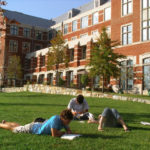My Path to Cornell ― A Real Student’s Story
This article is a first-person account from Moriah Adeghe, a Cornell University graduate, and CollegeVine livestreamer, contributor, and mentor. You can watch the full livestream for more info.
What’s Covered:
In this post, Moriah Adeghe, a graduate of Cornell University discusses her path to college. She talks about where she attended high school, which advanced placement (AP) classes she took, and how she used her science skills to improve her ACT score.
My High School
I attended a private college preparatory high school with a fairly robust college guidance program. That experience, as well as my identity as a first-generation, low-income student definitely influenced my perspective on the application process and college experience.
My high school offered 23 AP classes, so students had the opportunity to show colleges our academic ability and go beyond with our course loads.
My AP Course Load and GPA
I took both honors and AP classes throughout high school. At the time, I thought I would be a biology major on a premed track, so most of my classes were very STEM (science, technology, engineering, and mathematics)-focused. Once deciding to attend Cornell, I opted not to take some of my AP exams as I knew I wouldn’t get college credit for those classes, regardless of my score.
I struggled academically early in high school. During my freshman year, I had a flat 3.0 GPA, which is not typically what you see among students admitted to Cornell. As I continued advancing in grade level, my GPA increased significantly toward a 4.0.
Don’t let a low GPA early in high school deter you from applying to colleges like Cornell. The upward trajectory in your GPA is what they are looking for, and it will be an asset to your application.
Standardized Testing
I never took the SAT. Instead, I decided to focus on the ACT entirely. Because I was a strong science student, I thought my performance in the science section would raise my composite score adequately. That proved to be true, and I’m glad that I approached the exam that way.
I ended up taking it twice. The first time I got a 30, and the second time—the result that colleges reviewed—I got a 33.
My Extracurriculars
I participated in a variety of extracurriculars while in high school and was able to list those on my application.
My high school required us to participate in athletics every year and do 40 hours of community service. I participated in Model UN for a short time as well and was the president of the baking club. I also did research because I was interested in going into STEM.
For my high school itself, I worked as a tour guide and admissions ambassador to help provide information and answer questions for prospective students. I was also on the library advisory board, which was a group that helped communicate what students wanted to the librarians. I got to work shifts at the library after school, which was a great experience.
My extracurriculars outside of my high school were important to me too. I was very interested in social justice awareness and advocacy, so I volunteered for Hilary Clinton’s presidential campaign as an intern. Additionally, I was part of my local NAACP chapter on the Youth Council’s executive board.
Are you curious about how extracurriculars support a college application? Read CollegeVine’s guide to The Best Extracurriculars for Impressing Colleges.



